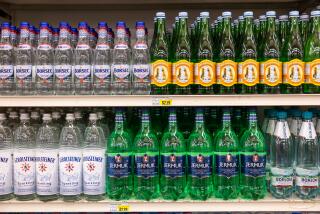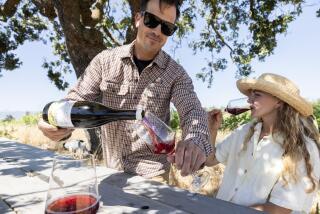A Treasure in Temecula : At the Callaway Winery, the Wines and the Roses are Both Worth a Visit
Southern Californians eager to visit a major winery should consider the Callaway Vineyard & Winery in Temecula, less than a two-hour drive from Los Angeles and only an hour from many Orange County locations. The reception one gets there is warm, and the environment of vines, wines and roses galore makes it seem like paradise. What’s more, the wines are wonderful.
The potential is there for a great day: Groups of from 24 to 60 can make reservations for a luncheon impeccably served in a shaded outdoor grape arbor overlooking the rolling vineyard estate, along with a guided tour of the modern winery and a sit-down, seminar-style tasting of Callaway wines. The lunch features a choice of delicious meals, including an Early-California Barbecue ($20), a Taste of the South Coast ($24) and Country Elegance, which is grilled duckling ($30); two other meals--the Callaway Croissant luncheon ($16) and the Vintner’s Veal Cassoulet ($17)--are available only on weekdays. (All prices are per person.) The event starts at 11 a.m., with lunch at 1 p.m. The food is matched to the wines: Only fresh fruits and vegetables are used, no MSG or sulfites are added and salt is used sparingly. You can’t match this experience in the North Coast wine country. (After Jan. 1, prepared box lunches can be had for either $9 or $11, for six persons or more, also by reservation.) But if you just want to drop in, there are free tours every hour on the hour, seven days a week, from 10 a.m. to 5 p.m.; there are also educational wine lectures ($1) accompanied by wine tastings.
As the land is free of phylloxera (plant lice), vines can be planted on their own vinifera roots, resulting in truer varietal character and more regal natural flavor. This is in contrast to some of the finest vineyards of Europe, where grafted rootstock is imperative because of phylloxera.
The first Callaway wines were made from the harvest of 1974. On the occasion of the visit of Queen Elizabeth II to the United States for the Bicentennial in 1976, wine was on the menu for the official luncheon at the Waldorf-Astoria in New York City. A committee that had tasted many wines selected the 1974 Callaway White Riesling. Her Majesty not only enjoyed the brilliant white wine but requested a second glass. (The Waldorf-Astoria menu and a handsome, gold-etched wine glass are exhibited at the winery.)
Today, Callaway has 320 acres in mature bearing. Driving through the rose-dotted rows recently with John Moramarco, a 10th-generation grape grower, I was struck by the appearance of the tall, healthy vines with lush canopies of leaves and with the distinctive appearance of 100% quadrilateral cordon-pruning growth--four separate vines extending from each mature rootstock.
“This,” Moramarco explained, “gives better photosynthesis and allows more sunlight into the canopy, resulting in better fruit development.”
At the grape reception area alongside the new winery building, wine maker Dwayne Helmuth observed: “We’re set up for white wines only, which we make as delicate as possible. Separation of juice from the grape, the skin, the seed, the pulp . . . is made right there, between the de-juicer and the press . . . in six minutes. No skin contact. We make a different, more delicate style of wine, to let the fruit show through. We take no must into the winery, only free-run juice, which goes into stainless-steel fermenters.”
We moved to the tasting room. I rated the 1984 Temecula Chardonnay ($9) a solid 19/20 for its silky elegance. This Chardonnay has a crisp, clean character, not the softness of Meursault that many other California Chardonnays feature. (The 1983, still available, is a deeper gold, with more depth from added age.)
Next came a 1984 Sauvignon Blanc ($7.75), softer than the oak-touched wine of the same grape, the 1984 Fume Blanc that sells for $7.50. Then a 1985 Chenin Blanc ($6.25), which Callaway communications director Betz Collins says she suggests as “the wine for people who are just beginning to enjoy wine.” Actually, it’s drier than the French Chateau Moncontour, but it does have that beguiling edge of grape-sweetness.
There are many wine experiences in store for a visitor to Callaway: Riesling, Gewurztraminer, the luscious botrytised “Sweet Nancy” of Chenin Blanc, and a new “wonder” wine, Callaway’s first Late Harvest Chardonnay, with 15.6% residual sugar and a light 8.8% alcohol. Bottled only in 10ths, retailing for about $18, it’s a treasure to share on special occasions. Only 500 cases were made. Properly stored, it will last for years. Don’t miss it.
Look at your calendar, talk to some friends, set a date and call the winery at (714) 676-4001. Or, if you just want to have a great wine experience by yourself or with another person or so, Callaway has Special Event days planned throughout the year; the next one that’s not yet booked solid is Sunday, Jan. 18, 1987. The theme will be “Winter, the Promise,” and the goings-on will revolve around what occurs at a winery during the winter. For $25, you will get a tour, an educational tasting session and lunch that ties in with the theme. All Special Events start at 11 a.m. and last about four hours.


